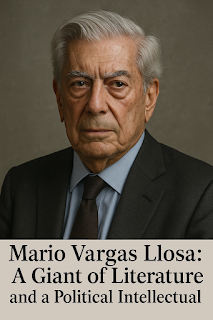Mario Vargas Llosa, born on March 28, 1936, in Arequipa, Peru, is among the most notable Latin American authors and intellectuals of the 20th and 21st centuries. His efforts have brought him international acclaim, including the Nobel Prize in Literature in 2010. Llosa's writing career has spanned many decades, with his writing covering topics like political power, social hierarchies, and the intricacies of human nature. His plays, essays, and novels are a testimony to his intensive immersion in both the Latin American culture and the general philosophical inquiry regarding freedom, identity, and the state's influence on personal lives.

The writing career of Llosa started during his young age, when he was exposed to such writers as Franz Kafka, F. Scott Fitzgerald, and William Faulkner. He was one of the main figures of the Latin American literary boom of the 1960s, an era marked by a burst of creativity in writing, with writers like Gabriel García Márquez, Julio Cortázar, and Carlos Fuentes. His first novel, *The Time of the Hero* (1959), which was a critique of the corrupt military academies in Peru, established him as a writer who would not shy away from the political and social challenges of his nation. The style of Vargas Llosa is characterized as complex, involving frequent changes of narrative perspective, rich characters, and strong involvement with historical and political contexts. Perhaps his best-known work, *Conversation in the Cathedral* (1969), examines the interconnection of individual lives with national history under the Peruvian military dictatorship of Manuel A. Odría. The complex novel structure and its investigation of the corrupting influences of political power were innovative for its time.
Aside from his works of fiction, Vargas Llosa has been a vocal political figure.
Originally aligned with left-wing politics, Vargas Llosa transitioned toward liberalism later in life, championing free-market capitalism, individual rights, and democracy. This change has made him a polarizing figure, particularly in Latin America, as his criticisms of populist governments and endorsement of neoliberal policies have frequently fueled debates. His political writing, such as in *The Feast of the Goat* (2000), which examines the Trujillo dictatorship of the Dominican Republic, shows his continued interest in authoritarianism and the misuse of power. Besides his fiction and essays, Llosa has also published plays and been engaged in journalism, adding another dimension to Latin America's intellectual sphere and far beyond. His dedication to democracy, free expression, and advocacy of human rights makes him more than an influential literary figure; he is an important thinker of politics.
The influence of Mario Vargas Llosa on Latin American literature and culture is immeasurable. His writings remain canonical and influential for their depth, seriousness of purpose, and current relevance to social and political problems. Llosa's fiction and political activism have established him as one of the greatest writers of his generation.

Comments
Post a Comment
Comment